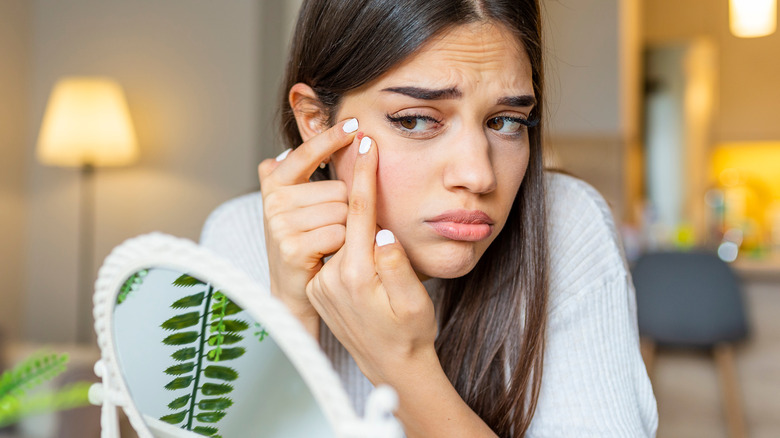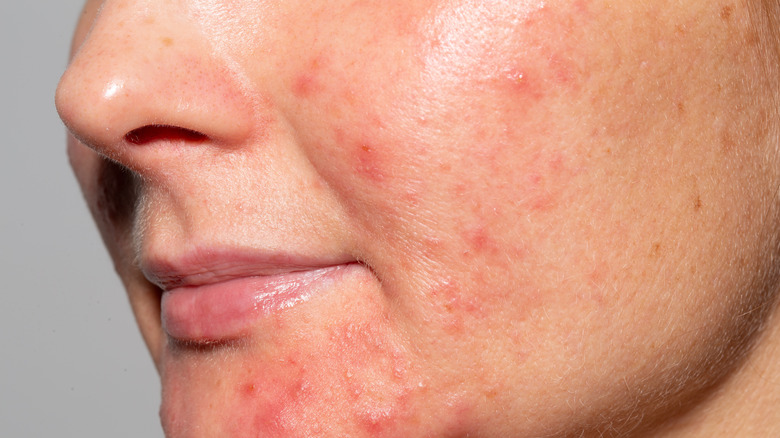Why You Should Never Pick At Cystic Acne (And How To Treat It Instead)
Pimple popping is a hard habit to quit. Every time we look in the mirror and see a dreaded spot surface, the instinct to pop it just takes over. Regardless of how many warnings we receive about its ill effects, the urge to get rid of unsightly blemishes as quickly as possible is almost impossible to resist. Although it can be oddly satisfying to pop a pimple, it's generally not a good idea because it creates more problems than it solves.
Dermatologist Zakiya RiceWhen, MD, explained to WebMD that your pimple contains bacteria, oil, and other gross stuff. Popping sets it all free to wreak havoc across your pores by seeping into them and birthing even more pimples. Another obvious downside to popping deeper, more persistent pimples is that it may create scarring, which will cost you time, effort, and money to fix.
It's best to stay away, but if you can't, there are a few cases where popping might not be quite as damaging — provided you do it the right way. Speaking to Greatist, cosmetic dermatologist Dr. Michele Green strongly advised against pustule or pimple popping, but she acknowledged that blackheads and whiteheads can be removed at home as long as you practice good hygiene and follow the right technique. Cystic acne, on the other hand, should definitely be left alone.
Popping cystic acne doesn't serve your best interests
Cystic acne is generally easier to identify because it will be far more severe than just the occasional pimple. Dr. Brian Hibler, MD, a board-certified dermatologist, laid out the distinction between them to InStyle: "Cystic acne is different from regular acne because it is deeper, often tender nodules. The individual lesions are often bigger than regular acne bumps." Likewise, it lasts considerably longer than a regular breakout. Cystic acne is caused by cysts forming in a much deeper layer of your skin so the problems run deeper than your standard pimple and should be treated as such.
Popping cystic acne is counterproductive because it doesn't solve the problem and only leads to bigger, more painful pustules. Moreover, board-certified dermatologist Dr. Dendy Engelman, MD, cautioned Women's Health about the ill effects of popping cystic acne by pointing out, "The inflammation that accompanies cystic acne can hinder the healing process and often lead to permanent scarring that's impossible to eliminate."
Don't be fooled by cystic acne bumps that come with whiteheads either. They still run deep and popping them like you would regular pimples will only increase your risk of infection and lead to a bigger outbreak down the line, due to the bacteria spillage. Instead of picking at or popping cystic acne, you should take effective measures to treat it.
Consult a dermatologist to treat cystic acne properly
A dermatologist is your best bet when dealing with cystic acne because treatment often requires specially-formulated medication. A dermatologist can also offer a relatively quick fix for the problem. Dr. Sandra Lee, MD, a dermatologist whom you may know better as Dr. Pimple Popper, informed Reader's Digest that, "Dermatologists can also locally inject corticosteroids into your cystic acne, and this can help resolve some individual lesions within 24 hours."
If that's not an option, you'll need to change up your skincare routine ASAP. Ideally, you should craft one that's tailored towards reducing cystic acne. To begin with, you need to find the perfect spot treatment for you. Dermatologist Dr. Mona Gohara, MD, advised Cosmopolitan: "A cocktail of benzoyl peroxide and 1 percent hydrocortisone cream can help flatten the zit faster." Regularly and gently cleanse your skin to rid it of impurities and bacteria that might've caused the breakout in the first place.
For sensitive skin, you should find a super-kind cleanser with a good concentration of salicylic acid, a well-known ingredient known to help with acne. Likewise, switching your regular skincare products for non-comedogenic ones will keep your pores free of build-up and prevent future problems. A good, old-fashioned cold compress can also reduce pain and swelling. Above all else, remember to be patient with your cystic acne because it can take several months to heal.


